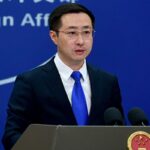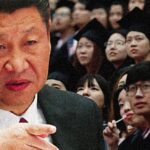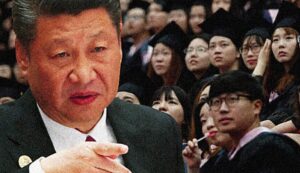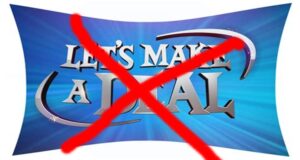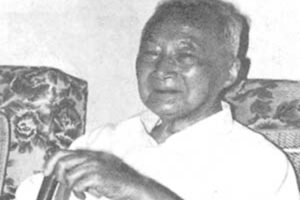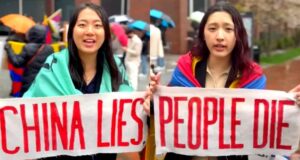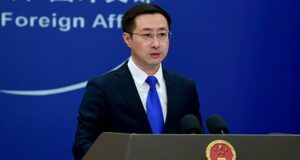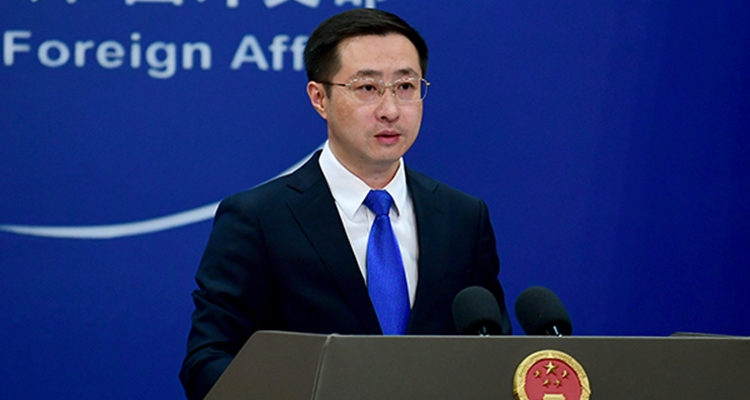
On June 3, 2025, U.S. Secretary of State Marco Rubio made a formal statement to “commemorate the bravery of the Chinese people who were killed as they tried to exercise their fundamental freedoms, as well as those who continue to suffer persecution as they seek accountability and justice for the events of June 4, 1989.”
Dissatisfaction
People are harder to memory-wipe than CCP-controlled AI bots like DeepSeek, which tends to mutter “Gee, that’s beyond my scope” when users bring up the question of what happened at Tiananmen Square on June 4, 1989.
The Party feels obliged, then, to blast Rubio and other U.S. government officials as somehow getting it all wrong and stirring up trouble when they mention any of the Chinese government’s past or present murders and other misdeeds (“China calls Rubio’s comments on Tiananmen Square crackdown an ‘attack,’ ” The Strait Times, June 4, 2025).
Chinese Foreign Ministry spokesman Lin Jian (shown above): “The erroneous statements by the US side maliciously distort historical facts, deliberately attack China’s political system and developmental path, and seriously interfere in China’s internal affairs. The Chinese side is strongly dissatisfied with this and firmly opposes it.”
Any perpetrator of evil may be “strongly dissatisfied with” condemnation of the evil. What’s that got to do with anything?
The reports don’t say what, in Lin’s view, are the actual historical facts about the events of June 4, 1989 that Rubio supposedly got all wrong, whether innocently or maliciously. Did the guns not fire and the tanks not roll? The Chinese Foreign Ministry’s transcript of Lin Jian’s regular press conference June 4 includes no mention of Rubio or Tiananmen Square.
Tension
Meanwhile, another CCP spokesman-propagandist, Chen Binhua of China’s Taiwan Affairs Office, has been tackling another instance of alleged Rubio fact-fudging, pertaining to the defense of Taiwan, which Chen says “belongs to China, and we will never allow any force to turn the island into a ‘hell’.”
Chen or China Daily, or both, heavily rely on the sneer-quote method of wishing facts away (“United States urged to stop stoking Taiwan tensions,” China Daily, May 29, 2025).
The Republic of China needs to defend itself against a potential invasion by the mainland—an invasion that the People’s Republic of China has been threatening for decades. “Defense”? “Invasion”? “Threat”? “Self-defense”? Good golly, how do people come up with these fantastical conceptions?
Rubio is not the only troublemaker on the globe who tosses around these kinds of obscure and inexplicable, deranged notions. According to China Daily:
Koo Li-hsiung, Taiwan’s “defense” chief, said in an interview last week that Taiwan’s armed forces must reach a high level of combat readiness by 2027 to effectively deter a possible “invasion”. He also stressed the need to enhance security exchanges with countries along the “first island chain”.
Chen denounced what he described as US politicians’ exaggeration of a mainland “threat”.
“They promote a warlike atmosphere in the Taiwan Strait, merely making excuses to interfere in the Taiwan question and benefit the US military-industrial complex,” the spokesman said. “The US consistently prioritizes its own interests, and its actions are actually harming and undermining Taiwan, turning Taiwan compatriots into ‘cannon fodder’.”
In other words, if China “invades,” whatever that is, the U.S. will be the party that has caused this “invasion,” whatever that is, by egging on and assisting the ROC’s “defense,” whatever that is. The ROC’s “defense” officials, if you want to call them that, would never have come up with their strange notions about “self-defense” and the need to counter some kind of “threat” from across the Strait on their own.
“Threats” and threats
Are U.S. politicians exaggerating the “threat” that the mainland poses for the Republic of China?
The answer depends on exactly what we’re talking about. There’s a threat. It needs to be deterred (er, I mean, “deterred,” whatever that is). It has been deterred, partly. The cyberattacks, propaganda, espionage, various efforts to undermine ROC preparedness and infiltrate Taiwanese society, the visible military drills in the Strait to practice invasion and blockade, the picking of gray-zone fights in the South China Sea all continue unabated.
Analysts argue with each other about the nature of the threat that the mainland poses, whether it’s imminent, what exactly would happen if the People’s Republic of China initiates a blockade and/or invasion of Taiwan. But these kinds of disagreements are not what Chen and China Daily are chittering about.
